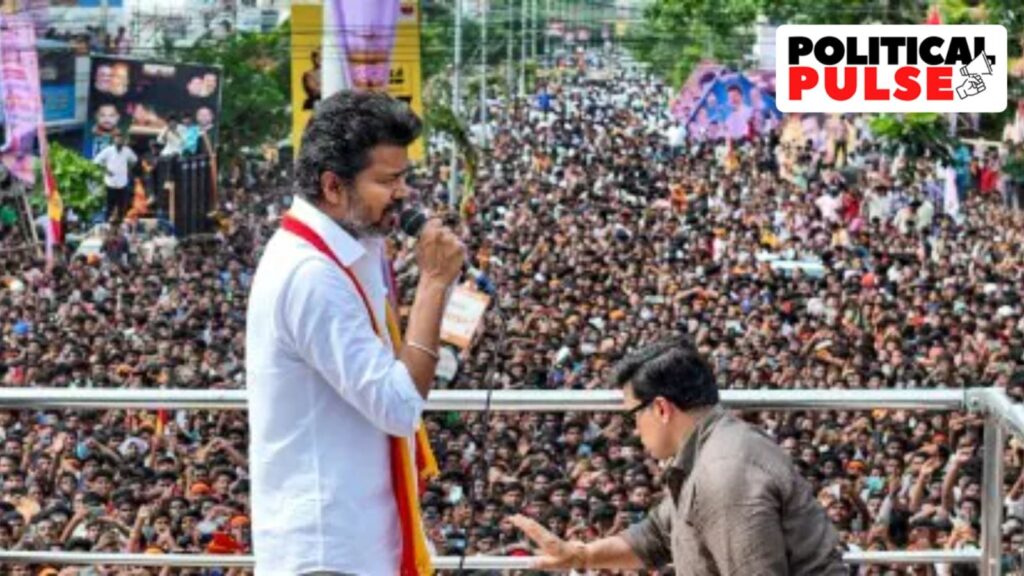A month after the deadly stampede at his rally in Karur, actor-turned-politician Vijay moved to steady his fledgling party and shut down talk of a pre-poll alliance. Senior leaders of the Tamilaga Vettri Kazhagam (TVK) said they will stand alone – neither with the BJP nor the DMK.
“Our stand on alliances remains unchanged,” TVK’s second-rung leaders reiterated after the party’s executive committee met for more than two hours at its Panaiyur headquarters on Wednesday. The message echoed the actor’s sharp pre-stampede declaration in Karur that his party would “contest on its own by projecting him as the chief ministerial candidate”.
It also came after a month of political silence, which had prompted leaders from the BJP and AIADMK to publicly court Vijay, and privately presume that the tragedy might push him into the comfort of a larger alliance.
Instead, TVK chose to make two announcements on Wednesday. First, the constitution of a 28-member executive committee – the party’s first formal organisational structure – to oversee daily operations. Second, a special general council meeting on November 5 in Mamallapuram, where Vijay will make his first public appearance since the September 27 stampede in Karur that killed 41 supporters.
For nearly four weeks, Vijay remained away from public life, with his party halting all events after the Karur tragedy. The quiet triggered two parallel reactions – criticism from rival parties questioning his leadership mettle, and overtures from both sides of the state’s polarised political aisle.
Senior BJP and AIADMK figures suggested he had “no path forward” without joining the NDA. The AIADMK’s post-Karur outreach was particularly pointed – some leaders framed joining hands with Vijay as a generational reset against the DMK.
The DMK, sensing the possibility of a realignment of anti-DMK votes, invited TVK to an all-party meeting on November 2 to protest the Election Commission’s Special Intensive Revision (SIR) of voter rolls. TVK had earlier opposed the revision, passing a resolution against it in July. But the Dravidian party’s invitation also served as a test of loyalty – or vulnerability – in a fast-shifting landscape.
At Wednesday’s meeting, senior leader K G Arunraj, a former IRS officer and party general secretary (propaganda), said the committee discussed “Vijay’s campaign plan, which will resume once the state government formulates the Standard Operating Procedure (SOP) for political gatherings”.
“We’ll ensure that his campaign meetings aren’t an obstruction to the people. We will plan in a way that we reach maximum people,” he said.
The shadow of the stampede remains heavy. On October 27, Vijay met 37 families of victims privately. Each family received a framed photograph and a Rs 5 lakh health insurance policy, according to party sources. The encounter – conducted behind a screen – drew both solemn appreciation from some supporters and quiet criticism for its choreography.
One immediate political jolt came earlier this week, when Shankavi Perumal, whose husband died in the stampede, returned the Rs 20 lakh compensation offered by Vijay. She was upset over the actor’s decision to summon grieving families to a Mamallapuram resort rather than visiting them in Karur.
Even after a month off the field, his political ambition continues to generate anxious calculations across parties. DMK strategists view him as siphoning disaffected AIADMK youth; AIADMK veterans fear losing their own emerging cadres to his charisma and cinematic appeal. BJP functionaries, too, have calculated that a Vijay-BJP-AIADMK alignment could create a consolidated anti-DMK front – and possibly make him the NDA’s face in the state.
But Vijay, at least for now, has chosen the high-risk road of independence.
By continuing to reject alliances, he implicitly seeks to inherit the anti-DMK space in his own right – a move similar to MGR’s breakaway gamble in the late 1970s, though the context and political culture differ starkly.
A state election is expected in 2026.

